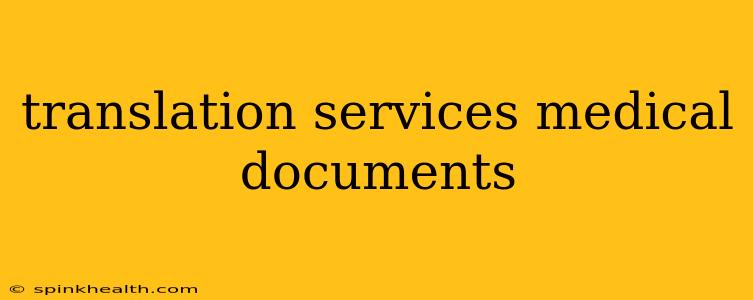The hushed tones of a doctor's office, the urgent beeping of medical equipment, the quiet hope in a patient's eyes – these are the scenes that underscore the critical importance of accurate medical translation. A misplaced word, a misinterpreted phrase, can have devastating consequences. This isn't just about converting words from one language to another; it's about bridging cultures, ensuring patient safety, and facilitating effective healthcare. This journey into the world of medical document translation services will unravel the complexities, the challenges, and the critical considerations involved.
What are the different types of medical documents that need translation?
The scope of medical documents requiring translation is surprisingly vast. It encompasses everything from patient records and medical histories to clinical trial protocols, research papers, informed consent forms, and pharmaceutical packaging inserts. Imagine a scenario where a crucial detail in a patient's allergy history is lost in translation – the potential for adverse reactions is immense. Similarly, inaccurate translation of a pharmaceutical label could lead to medication errors with potentially life-threatening consequences. The need for precision is paramount in every single document.
How do I choose a reliable medical translation service?
Selecting a medical translation service requires meticulous due diligence. It's more than just finding someone who speaks multiple languages; it's about finding experts who deeply understand the intricacies of medical terminology and the cultural nuances that influence healthcare practices. Look for services that employ translators with specific medical backgrounds, such as doctors, nurses, or pharmacists. Furthermore, inquire about their quality assurance processes – are documents reviewed by multiple translators or editors? Do they utilize translation memory tools to ensure consistency and accuracy? These questions are essential in safeguarding the integrity of the translations.
What are the common challenges in medical document translation?
The challenges inherent in medical document translation are multifaceted. The specialized vocabulary, the constantly evolving medical terminology, and the cultural differences in healthcare practices all contribute to the complexity. Consider the challenge of translating a diagnosis from one language to another – a simple word-for-word translation might not accurately convey the nuances of the condition. Moreover, maintaining confidentiality and adhering to strict data privacy regulations (like HIPAA) is crucial. A reliable service will have robust systems in place to ensure the security and privacy of sensitive medical information.
What is the cost of medical document translation services?
The cost of medical document translation services varies depending on several factors: the length and complexity of the document, the language pair involved, the required turnaround time, and the level of expertise required. While it's impossible to provide a fixed price, it's advisable to obtain quotes from several reputable services before making a decision. Remember, prioritizing cost over quality can be detrimental, potentially leading to costly mistakes down the line.
What are the benefits of using professional medical translation services?
The benefits extend far beyond simple linguistic conversion. Using a professional service ensures accuracy, consistency, and cultural sensitivity, minimizing the risk of misinterpretations that could harm patients. It allows healthcare providers to communicate effectively with patients from diverse backgrounds, fosters better patient care, and contributes to more effective global healthcare collaborations. Moreover, it can facilitate smoother clinical trials and ensure compliance with international regulations. In the end, it's an investment in accuracy, safety, and effective communication in a field where precision is paramount.
Conclusion: Accuracy and Trust in a Critical Field
The world of medical document translation is a realm where precision and accuracy are not just important – they are paramount. Choosing the right translation service is a decision with significant ramifications. By carefully considering the factors discussed above, healthcare professionals and organizations can ensure that their translated documents accurately convey critical information, fostering effective communication and promoting patient safety. Remember, a single word can make all the difference.

